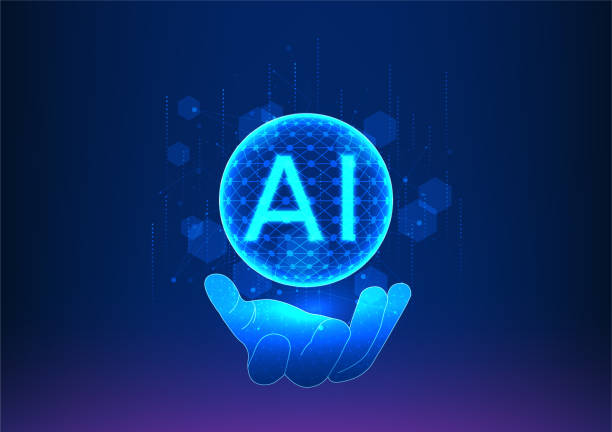What is Artificial Intelligence? Definition, History, and Basic Concepts

Artificial intelligence (AI) is a broad field in computer science that deals with building machines capable of performing tasks that usually require human intelligence.
These tasks include learning, problem-solving, understanding natural language, pattern recognition, and decision-making.
In other words, artificial intelligence is an effort to simulate human thought processes in machines.
The history of #artificial_intelligence dates back to the 1950s, when computer scientists began exploring the possibility of building intelligent machines.
Since then, the field has faced many ups and downs, but recent advances in machine learning and computing power have made artificial intelligence one of the most important and widely used technologies today.
Basic concepts in artificial intelligence include algorithms, data, machine learning, neural networks, and natural language processing.
Algorithms are a set of instructions that tell machines how to perform a task.
Data is information that machines use to learn and make decisions.
Machine learning is a process that allows machines to learn from data without being explicitly programmed.
Neural networks are models inspired by the structure of the human brain and are used to solve complex problems.
Natural language processing allows machines to understand and produce human language.
Understanding the basic concepts of artificial intelligence is essential for understanding its application and capabilities.
Are you losing business opportunities because of an old website? With Rasaweb, solve the problem of not attracting potential customers through your website forever!
✅ Attract more high-quality leads
✅ Increase brand credibility in the eyes of customers
⚡ Get a free consultation on corporate website design
Types of Artificial Intelligence: From Expert Systems to Deep Learning

Artificial intelligence can be divided into different types based on its capabilities and the type of tasks it performs.
One of these classifications is based on the power of intelligence, which includes Narrow AI and General AI.
Narrow AI is designed to perform a specific task, such as facial recognition or language translation.
In contrast, General AI is capable of performing any task that a human can perform.
Examples of Narrow AI include expert systems, speech and image recognition, and chatbots.
General AI is still in the research stages and has not yet become a reality.
Another classification is based on the learning method, which includes machine learning, deep learning, and reinforcement learning.
Machine learning allows machines to learn from data without being directly programmed.
Deep learning is a type of machine learning that uses deep neural networks to solve complex problems.
Reinforcement learning allows machines to learn by interacting with their environment and receiving rewards and penalties.
Choosing the right type of artificial intelligence depends on the type of problem and the available data.
Applications of Artificial Intelligence in Everyday Life and Various Industries

The applications of artificial intelligence in everyday life and various industries are very broad and diverse.
Everyday applications include voice assistants like Siri and Alexa, movie and music recommendation systems, and spam filters.
In industry, artificial intelligence is used in process automation, production optimization, defect detection, and predictive maintenance.
In medicine, artificial intelligence is used in disease diagnosis, drug development, and treatment personalization.
In transportation, artificial intelligence is used in self-driving cars and route optimization.
Artificial intelligence is reshaping various industries and improving the quality of human life.
With the ever-increasing advancement of artificial intelligence, its applications are expected to become more widespread and complex in the future.
Artificial intelligence also has many applications in marketing and sales, including customer behavior analysis, advertising personalization, and sales forecasting.
In finance, artificial intelligence is used in fraud detection, risk management, and automated investment.
In education, artificial intelligence is used in learning personalization, providing automated feedback, and developing educational content.
This diversity in applications shows that artificial intelligence has a high potential for improvement and transformation in various fields.
Advantages and Disadvantages of Artificial Intelligence from Different Perspectives

Artificial intelligence, like any other technology, has numerous advantages and disadvantages.
Advantages of artificial intelligence include increased productivity, reduced errors, improved accuracy, and performing dangerous tasks.
Artificial intelligence can automatically perform time-consuming and repetitive processes, leading to increased productivity and reduced costs.
Also, artificial intelligence can identify patterns by analyzing large and complex data that humans are unable to see, leading to improved accuracy and decision-making.
On the other hand, disadvantages of artificial intelligence include the high cost of development and implementation, dependence on data, and ethical concerns.
Developing and implementing artificial intelligence requires a large investment in hardware, software, and specialized human resources.
Also, the performance of artificial intelligence depends on the quality and quantity of data, and if there is incomplete or incorrect data, incorrect results may be obtained.
Ethical concerns related to artificial intelligence include job loss, discrimination, and data misuse.
With process automation, many jobs may be lost, and the need for retraining and new skills will arise.
Also, artificial intelligence algorithms may be trained based on discriminatory data, leading to discrimination in decision-making.
Misuse of data is also a serious concern, as artificial intelligence can be used to monitor and control individuals.
Therefore, it is necessary to pay special attention to ethical issues in the development and use of artificial intelligence.
Research shows that 80% of customers trust companies with professional websites more. Does your current website earn this trust?
With Rasaweb’s corporate website design services, solve the problem of customer mistrust and a weak online image forever!
✅ Create a professional image and increase customer trust
✅ Attract more sales leads and grow your business
⚡ Get a free consultation
What Will the Future of Artificial Intelligence Be? Key Predictions and Trends

The future of artificial intelligence is very bright and full of potential.
Predictions indicate that artificial intelligence will play a much more important role in everyday life and various industries in the future.
Key trends in artificial intelligence include the development of General AI, the increased use of deep learning, and the expansion of artificial intelligence applications in new areas.
General AI can create huge transformations in society, but it also raises serious ethical and security concerns.
Deep learning continues to develop as one of the most powerful machine learning methods and allows for solving more complex problems.
Applications of artificial intelligence in new areas such as agriculture, energy, and the environment are expanding and can help solve global challenges.
One of the important trends in the future of artificial intelligence is the increased use of Edge AI.
Edge AI means running artificial intelligence algorithms on local devices, without the need to send data to a central server.
This can increase speed, reduce latency, and improve security.
It is also expected that artificial intelligence will combine with other technologies such as the Internet of Things, blockchain, and augmented reality in the future and provide new possibilities.
Therefore, the future of artificial intelligence is very exciting and full of new opportunities.
How Can We Use Artificial Intelligence in Our Business?

Using artificial intelligence in business can lead to improved productivity, reduced costs, increased revenue, and improved customer experience.
To get started, you first need to identify the needs of your business and see in which areas artificial intelligence can help you.
Then, you can collect the required data and select the appropriate artificial intelligence algorithms.
You can also use the services of companies providing artificial intelligence solutions.
Some applications of artificial intelligence in business include process automation, data analysis, sales forecasting, marketing personalization, and providing smart customer service.
By using artificial intelligence, you can make better decisions and increase your competitiveness.
One of the most important applications of artificial intelligence in business is data analysis.
By using artificial intelligence, you can analyze customer, sales, and marketing data and identify patterns that help you make better decisions.
For example, you can identify different segments of customers by analyzing customer data and personalize your advertising based on the needs of each segment.
You can also identify best-selling and low-selling products by analyzing sales data and adjust your sales strategies accordingly.
Using artificial intelligence in business requires proper planning and strategy.
Ethical and Social Considerations in the Development and Use of Artificial Intelligence

The development and use of artificial intelligence comes with serious ethical and social considerations.
One of the most important of these considerations is the issue of discrimination.
Artificial intelligence algorithms may be trained based on discriminatory data, leading to discrimination in decision-making.
For example, a facial recognition algorithm may be less accurate in recognizing faces of people with dark skin.
Therefore, it is necessary to pay special attention to the issue of discrimination in data collection and processing and to use algorithms that are fair and unbiased.
Another ethical consideration is the issue of privacy.
Artificial intelligence can be used to collect and analyze individuals’ personal data, which may lead to a violation of privacy.
For example, companies may use artificial intelligence to track people’s online behavior and collect information about their interests and preferences.
Therefore, it is necessary to enact strict laws and regulations to protect individuals’ privacy against the misuse of artificial intelligence.
In addition, attention should be paid to the issue of accountability for decisions made by artificial intelligence.
If an artificial intelligence algorithm makes a wrong decision, who will be responsible?
Challenges Facing the Development and Implementation of Artificial Intelligence in Iran

The development and implementation of artificial intelligence in Iran faces many challenges.
One of the most important of these challenges is the shortage of specialized human resources.
The number of artificial intelligence specialists in Iran is very low compared to developed countries, and there is a need to train new forces in this field.
Also, the lack of investment in artificial intelligence research and development is a serious challenge.
The government and the private sector must invest more in this area so that Iran can make progress in the competition with other countries in the field of artificial intelligence.
Another challenge is the lack of quality and accessible data.
Artificial intelligence algorithms need a lot of data to learn, and if there is no quality and accessible data, their performance will be limited.
Therefore, it is necessary to collect and organize various data in different fields and make it available to researchers and companies.
In addition, the existence of legal and regulatory barriers can also hinder the development and implementation of artificial intelligence in Iran.
Does your company website perform as befits your brand? In today’s competitive world, your website is your most important online tool. Rasaweb, a specialist in professional corporate website design, helps you to:
✅ Build credibility and customer trust
✅ Convert website visitors into customers
⚡ Get a free consultation!
Resources and Tools for Learning Artificial Intelligence for Beginners and Experts

Learning artificial intelligence can be a challenging but very rewarding process.
Fortunately, there are many resources and tools to help people learn artificial intelligence.
For beginners, there are many online courses, books, and video tutorials that explain the basic concepts of artificial intelligence in simple language.
Some of these courses are free, and others require payment.
For experts, there are many scientific articles, conferences, and training workshops that explore more advanced topics in artificial intelligence.
There are also many tools for developing and implementing artificial intelligence that help people create and test their own artificial intelligence algorithms.
These tools include programming languages like Python, machine learning libraries like TensorFlow and PyTorch, and cloud platforms like Amazon AWS and Google Cloud.
Choosing the right resource and tool depends on your level of knowledge and experience.
If you are a beginner, it is better to start with simple online courses and books and then gradually move on to more advanced topics.
If you are an expert, you can use scientific articles and conferences to stay up-to-date with the latest advances in the field of artificial intelligence.
Also, using artificial intelligence development tools can help you create and test your artificial intelligence algorithms and improve your skills in this field.
Summary and Conclusion: Artificial Intelligence, Opportunities and Challenges

Artificial intelligence is a powerful and transformative technology that has the potential to improve human life and solve global challenges.
However, the development and use of artificial intelligence comes with serious ethical and social challenges that must be given special attention.
To fully exploit the opportunities of artificial intelligence and reduce its risks, it is necessary to invest in education, research and development, and the enactment of appropriate laws and regulations.
It is also necessary to discuss and discuss the ethical and social issues of artificial intelligence and find solutions to them.
Artificial intelligence provides many opportunities for businesses, governments, and individuals.
Businesses can use artificial intelligence to improve productivity, reduce costs, and increase revenue.
Governments can use artificial intelligence to provide better services to citizens and solve social problems.
Individuals can use artificial intelligence to improve their quality of life and learn new skills.
However, it is necessary to pay attention to the challenges of artificial intelligence and find solutions to deal with them.
Artificial intelligence can be a powerful tool for improving the world, if used properly.
FAQ
| Question | Answer |
|---|---|
| What is artificial intelligence? | It is a simulation of human intelligence in programmed machines to think like humans and mimic their actions. |
| What are the main branches of artificial intelligence? | Includes machine learning, deep learning, natural language processing, computer vision, and robotics. |
| What is Machine Learning? | It is a branch of artificial intelligence that focuses on enabling systems to learn from data and identify patterns without explicit programming. |
| Mention examples of artificial intelligence applications in our daily lives. | Voice assistants (such as Siri and Alexa), recommendation systems on Netflix and Amazon, self-driving cars, and facial recognition programs. |
| What is Deep Learning? | It is a subset of machine learning that uses multilayer (deep) artificial neural networks to process large amounts of data. |
| What is Natural Language Processing (NLP)? | It is a branch of artificial intelligence that focuses on enabling computers to understand, interpret, and generate human language. |
| What are some of the ethical concerns related to artificial intelligence? | Includes data bias, privacy, job loss, and accountability in case of errors. |
| What are the main benefits of artificial intelligence? | Increased efficiency, improved decision making, automation of repetitive tasks, and discovery of complex patterns in data. |
| How is artificial intelligence used in healthcare? | In diagnosing diseases, discovering drugs, analyzing medical images, and personalized patient care. |
| How do you see the future of artificial intelligence? | It is expected to continue to develop at a rapid pace, affecting all aspects of human life, from industry to education and entertainment. |
And other services of Rasa Web Advertising Agency in the field of advertising
Intelligent sales automation: an effective tool to increase sales by managing Google advertising.
Intelligent Marketplace: A professional solution to improve SEO ranking by focusing on customizing the user experience.
Intelligent Reporting: An innovative service to increase digital branding through custom programming.
Intelligent advertising campaign: An effective tool to increase sales with the help of custom programming.
Intelligent UI/UX: Designed for businesses looking to analyze customer behavior by optimizing key pages.
And more than hundreds of other services in the field of internet advertising, advertising consulting and organizational solutions
Internet advertising | Advertising strategy | Advertisement Reporting
Resources
What is Artificial Intelligence?
,What is Artificial Intelligence (AI)? All about artificial intelligence
,What is Artificial Intelligence? All about Artificial Intelligence (AI)
,What is Artificial Intelligence?
? To upgrade your business in the digital world, Rasaweb Digital Marketing Agency is your trusted partner. Among our specialized services, website design with a modern user interface creates a unique user experience for your audience.
📍 Tehran, Mirdamad Street, next to the Central Bank, South Kazerun Alley, Ramin Alley No. 6




